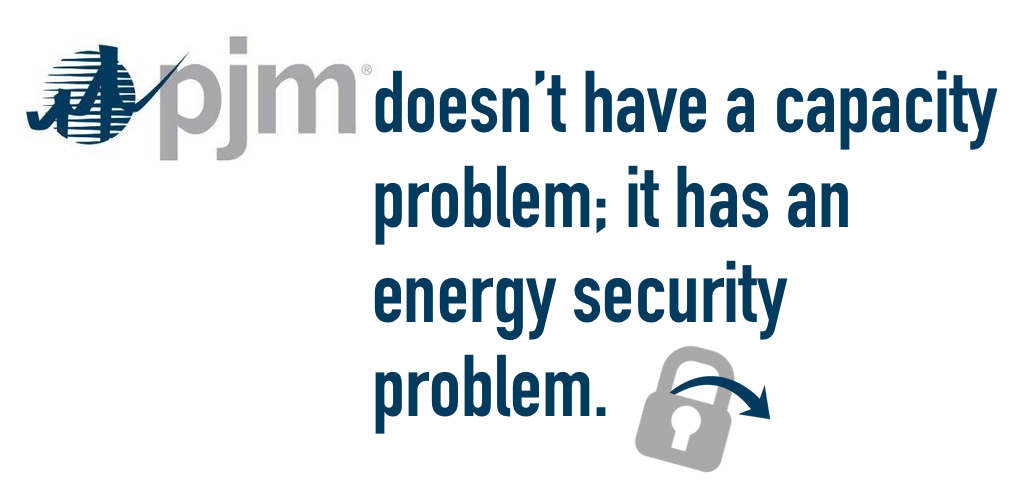
The Important Difference Between Capacity and Security
To hear environmental groups and renewable boosters tell it, the Federal Energy Regulatory Commission’s (FERC) recent action to restore competition to PJM Interconnection’s capacity market was a terrible solution in search of non-existent problem.
The capacity market is supposed to ensure that PJM’s customers will have adequate generating capacity, including a strong reserve of power, in case demand unexpectedly spikes or a plant unexpectedly falls offline when consumers need it most. Think of the critical conditions and surging demand for power in a polar vortex or during a summer heat wave.
But PJM’s capacity market has been slowly and now rather quickly coming undone. Like a snowball hurtling down hill picking up weight and momentum, ever-accumulating state subsidies and mandates for renewable sources of power have created havoc on fair competition. Subsidies have proven so decisive, capacity auctions have recently possessed all the drama and unpredictability of a Harlem Globe Trotters and Washington Generals game. The result is an increasing number of baseload power plants – those that have proven essential in meeting spiking demand during adverse weather conditions – being pushed aside by less reliable alternatives.
FERC, recognizing a problem getting out of hand, opted for a fuel-neutral remedy to level the playing field. Any fuel source competing in the capacity auction must now bid in at a minimum price, effectively removing the distorting effects of state subsidies. With the subsidies gone, essential baseload plants that would have otherwise lost in the capacity auction are back in the mix.
While renewable advocates like to claim that their favored sources of power can stand on their own two feet and win in head-to-head competition, their reaction to FERC’s order is telling. They’ve levied all kinds of protests to FERC’s order, calling it an affront to state energy policy, a roadblock to clean energy deployment and, most loudly, simply unnecessary.
They believe it’s unnecessary because PJM is in no danger of a capacity shortfall and the reliability challenges that might entail. But this criticism completely – and perhaps deliberately – misses the crux of the issue. PJM doesn’t have a capacity problem; it has an energy security problem.
PJM currently has a robust capacity reserve, but it’s increasingly not made up of the generating capacity that underpins reliability and resilience. PJM is hardly the only market to be facing this challenge.
A report written last year for ISO New England, the grid organization overseeing the Northeast, found that “In today’s environment… we do not face a capacity shortfall problem (indeed, the system is awash in capacity). We, instead, face an energy security problem due to the constraints – and uncertainties – on energy for power production.”
The “today’s environment” they refer to is the proliferation of weather- and time-of-day-dependent renewable sources of power, and natural gas generation reliant upon just-in-time fuel delivery from an over-stretched and vulnerable pipeline network.
The authors of the ISO New England study presciently wrote of a value problem. Some resources are simply more valuable in boosting the reliability and resilience of the grid. On-demand sources of power, with months of fuel on-site and the ability to ramp up the power they provide to the grid when needed, are simply more valuable than others. Coal generation checks all these boxes. Unfortunately, it’s also essential coal generation that has been most affected by the proliferation of state subsidies in PJM’s capacity market.
Four utility executives wrote PJM last year begging for action to better value baseload units. They warned that “PJM has not taken the proactive steps needed to value resiliency attributes, such as fuel security and fuel diversity, of its generating fleet.” There warnings, echoed by the Department of Energy, remain unheeded.
Fortunately, FERC’s order is an important action in addressing a key source of pressure pushing baseload power plants into early retirement. It will help level the playing field, restore fair competition and it will go a considerable way towards fending off the approaching reliability crisis. However, it is at best a delaying action, not a resolution.
Markets must be reformed to ensure they properly value the attributes that ensure energy security, reliability and resilience. When these attributes are properly valued, the conclusion is unmistakable: the nation’s coal fleet is more important than ever.
- On January 6, 2020
